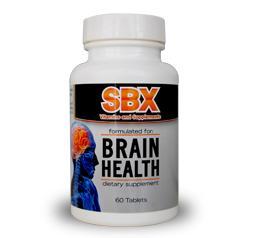Vitamin B12 and Folate improve Schizophrenia Symptoms
Our investigation of natural ingredients that could reduce the symptoms of schizophrenia have consistently highlighted B vitamins. It was clear from studies that we looked at very early on, that two of the core ingredient in SBX would be Vitamin B12 and Folate (also known as Vitamin B9). We have referenced the relevant studies on the SBX website, and you can find them here.
.jpg) Earlier studies compared folate blood serum (that part of the blood that does not contain cells or a clotting factor) levels of people with schizophrenia to healthy individuals. These studies found that people with schizophrenia had lower levels of folate and were more often deficient. Low folate levels are relevant to mental health and schizophrenia because folate is used by the body to manufacture neurotransmitters which send signals throughout the brain and body. Additionally, a vital process known as methylation that is partially responsible for maintaining the chemical balance of the brain, is dependant on folate and vitamin B12 . If a person gets enough, folate, vitamin B12 and vitamin B6, homocysteine levels in the body reduce. This is important because if there is too high a level of homocysteine (a toxic protein that the body makes from dietary protein) in the blood this is a sign that the methylation process is not working correctly, a problem that has been shown to be common in people with schizophrenia.
Earlier studies compared folate blood serum (that part of the blood that does not contain cells or a clotting factor) levels of people with schizophrenia to healthy individuals. These studies found that people with schizophrenia had lower levels of folate and were more often deficient. Low folate levels are relevant to mental health and schizophrenia because folate is used by the body to manufacture neurotransmitters which send signals throughout the brain and body. Additionally, a vital process known as methylation that is partially responsible for maintaining the chemical balance of the brain, is dependant on folate and vitamin B12 . If a person gets enough, folate, vitamin B12 and vitamin B6, homocysteine levels in the body reduce. This is important because if there is too high a level of homocysteine (a toxic protein that the body makes from dietary protein) in the blood this is a sign that the methylation process is not working correctly, a problem that has been shown to be common in people with schizophrenia.
Today we know that people with schizophrenia are more likely to have inherited genetics that mean they require more B Vitamins. A study of 235 schizophrenia patients at the Seoul National University in Korea, revealed homocysteine levels were higher and folate level were lower in patients when compared to healthy individuals. It also found that people with schizophrenia were more likely to have a variation of a gene responsible for one of the main homocystiene lowering enzimes. Doctors hypothesized that B vitamin supplementation may be able to compensate for this defective gene. The deficiency is not obvious because it results from genetics rather than diet.
A recent study was conducted at the Massachusetts General Hospital in Boston by Dr Joshua Roffman took researchers understanding a little further. It looked at the effect of providing both Vitamin B12 and folate to patients together with antipsychotic medication. The study involved 140 patients already under treatment and receiving antipsychotics. Patients were given supplements every day for four months. While all patients saw a little improvement, patients with a high function gene variant known as FOLH1 saw a significant decrease in negative symptoms. They became less withdrawn and apathetic and became less prone to depression. Roffman believes that this result was possible because FOLH1 controls the digestion of folate into the bloodstream. In the event that the study had continued longer those with the low functioning FOLH1 gene variant may also have benefited as more folate was absorbed into the bloodstream, according to the researchers.
So where are we now? We know that people with schizophrenia are more likely to have low levels of some B vitamins. We know that these vitamins are required for the proper functioning of the brain and that people with schizophrenia are more likely to have a genetic variation that seems to prevent the methylation process from working properly. Finally we know that supplementation with vitamin B12 and folate can reduce the negative symptoms of schizophrenia, particularly for people with the relevant gene.
Researchers agree that more studies are need. In the meantime it seems there is very little downside to supplementing with high quality B vitamins.
Follow @sbxsupplements


